The Risky Regencies’ interview by Cybil Solyn at Rakehell is now up–come and check us out:
http://www.rakehell.com/article.php?id=773&Title=Interview%3A-Risky-Regency-Ladies

The Risky Regencies’ interview by Cybil Solyn at Rakehell is now up–come and check us out:
http://www.rakehell.com/article.php?id=773&Title=Interview%3A-Risky-Regency-Ladies

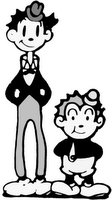 multiple “Tom and Jerrys” over time. Most of us know about the cat and mouse cartoon—probably the first in our awareness. I was looking for information on the Regency cartoonist who drew the “Tom and Jerry” young buck hellraisers. So far I have discovered yet another Tom and Jerry, published in 1932.“Tom and Jerry” was also the original stage name used by Simon and Garfunkel in 1957, and it is also a drink consisting of a beaten egg, Jamaican rum, brandy, powdered sugar, boiling water, and nutmeg. It has been used as the name of a folk/fiddle tune, restaurant(s), and likely many other things, it seems at least.
multiple “Tom and Jerrys” over time. Most of us know about the cat and mouse cartoon—probably the first in our awareness. I was looking for information on the Regency cartoonist who drew the “Tom and Jerry” young buck hellraisers. So far I have discovered yet another Tom and Jerry, published in 1932.“Tom and Jerry” was also the original stage name used by Simon and Garfunkel in 1957, and it is also a drink consisting of a beaten egg, Jamaican rum, brandy, powdered sugar, boiling water, and nutmeg. It has been used as the name of a folk/fiddle tune, restaurant(s), and likely many other things, it seems at least.
But the Tom and Jerry I was looking for were British cartoons published in London by R. Ackerman between 1815 and 1821. They were done by Pierce Egan, a chronicler of London low life during the Regency period, in a series called . Life in London, or Days and Nights of Jerry Hawthorne and his elegant friend Corinthian Tom. “Corinthian Tom and Jerry Hawthorn” were the characters he used to show the antics of certain rich young bucks causing mischief. They were two young men with a propensity for enjoying themselves and having “adventures.” I think I might call them “rakehells.”
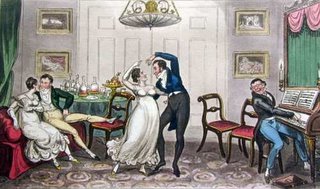
Tom and Jerry and Corinthian Kate
As with fashion prints, you can find Tom and Jerry prints for sale. I first made their acquaintance on…where else…Ebay.
If you would like to see a nice collection of these prints, go to this site. Kauai Fine Prints is a reseller of old prints, and luckily has a selection of “Life in London” on display. Also, you can view Mr. Egan’s cartoons featuring his “Doctor Syntax” character as well.
http://www.brunias.com/tom-jerry.html
Laurie
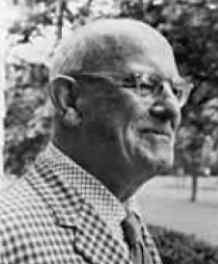
On Tuesday, Cara blogged about laugh-out-loud Regencies. As an author who tries, in her own modest way, to get people to laugh, it made me think about where my humor comes from. Some of it is unique to me: a father who loves language so much he’s got a wall full of word books (and, by the way, owned a copy of the 1811 Dictionary of the Vulgar Tongue long before I knew what a cully was), an abiding love for the Marx Brothers, stoked by frequent afternoon visits to the Harvard Square Theatre, not to mention devouring Scooby-Doo at an early age. Oh, those meddling kids!
But probably the most formative source was P.G. Wodehouse. 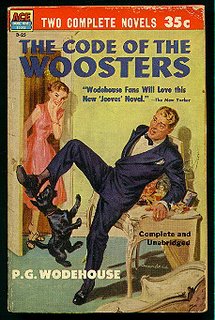 Like most everything else I read when I was young, I found his books in the room we called the library, but was really the place we threw all the books in the house (Bookcases were optional). I started with a Jeeves book, I’m fairly certain, and was immediately entranced with Wodehouse’s dextrous way with language. Simply put, the man is incredibly dry, terribly witty, and flat-out hysterical.
Like most everything else I read when I was young, I found his books in the room we called the library, but was really the place we threw all the books in the house (Bookcases were optional). I started with a Jeeves book, I’m fairly certain, and was immediately entranced with Wodehouse’s dextrous way with language. Simply put, the man is incredibly dry, terribly witty, and flat-out hysterical.
I grabbed a recent stoop sale find, A Wodehouse Bestiary, and opened it randomly to find this little gem:
“You’re what I call a rabbit.”
“A rabbit!”
“There is no stigma attached to being a rabbit,” said Sir Joseph, pacifically. “Every man with a grain of sense is one. It simply means that you prefer a normal, wholesome life to gadding about like a — like a nonrabbit. You’re going out of your class, my boy. You’re trying to change your zoological species, and it can’t be done. Half the divorces today are due to the fact that rabbits won’t believe they’re rabbits till it’s too late. It is the peculiar nature of the rabbit–”
“I think we had better join the ladies, Uncle Joseph,” said Roland, frostily. “Aunt Emily will be wondering what has become of us.”
Dry as a bone. I love it.
I’ve read every Wodehouse I could lay my hands on. And since he published ninety-six books, I’m fairly certain there are some I have missed–a treat I’ll save for my golden years. His Jeeves & Wooster books were turned into a miniseries, but even actors such as Hugh Laurie and Stephen Fry in the titular roles aren’t able to translate Wodehouse’s delicate touch from the page to the screen.
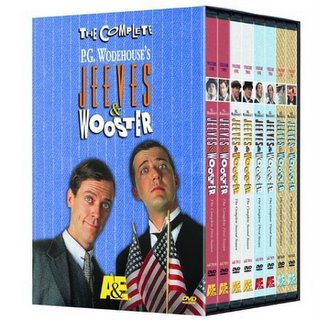
Hugh Laurie, who portrayed Jeeves in the British miniseries, writes about Wodehouse (full text by following this link):
To be able to write about P. G. Wodehouse is the sort of honour that comes rarely in any man’s life, let alone mine. This is rarity of a rare order. Halley’s comet seems like a blasted nuisance in comparison.
If you’d knocked on my head 20 years ago and told me that a time would come when I, Hugh Laurie – scraper-through of O-levels, mover of lips (own) while reading, loafer, scrounger, pettifogger and general berk of this parish – would be able to carve my initials in the broad bark of the Master’s oak, I’m pretty certain that I would have said “garn”, or something like it.
(As a sidenote, both Laurie and his partner, Stephen Fry, who played Wooster, are also published authors in addition to being actors. Stephen Fry talks about Wodehouse here).
Humor is so hard to convey. Too much, and you’re doing slapstick; too little, and all you get is a wan smile. P.G. Wodehouse achieved the perfect (dry) balance in most of his writing.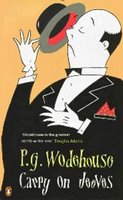
Have you read Wodehouse? If not, there are plenty of short story collections that’ll give you a taste of his style. If so, do you like him? What other humor authors, outside of romance, do you like? What’s your favorite kind of written humor?
Me, I’m dicing back into “Something Squishy” from A Wodehouse Bestiary.
Megan

 It is a fact universally acknowledged that when discussing the works of Jane Austen, the topic of who is her successor comes around. Who do you think has filled her unfillable shoes? I propose Stella Gibbons, author of Cold Comfort Farm, a classic that has this quote from Mansfield Park in its frontispiece: Let other pens dwell on guilt and misery.
It is a fact universally acknowledged that when discussing the works of Jane Austen, the topic of who is her successor comes around. Who do you think has filled her unfillable shoes? I propose Stella Gibbons, author of Cold Comfort Farm, a classic that has this quote from Mansfield Park in its frontispiece: Let other pens dwell on guilt and misery.
It’s the story of Flora Poste, a young woman who likes to have order and sense in her world. When she is orphaned, she goes to live with her distant relatives, the Starkadders of Cold Comfort Farm. There, Flora, whose mission in life is to collect material for a book she will write three decades later in the style of Jane Austen, finds the Starkadders in dire need of not only sense and sensibility but persuasion too. She sets to work reforming her relatives, channeling their peculiar energies into rewarding occupations. Even though Gibbons is satirizing the earthy, elemental novels of Mary Webb, wildly popular in the 1920s and 1930s, it doesn’t matter if you haven’t read them–the book is still as funny as a rubber crutch. Particularly purple passages are marked with asterisks like a travel guide.
There’s Amos, the preacher who leads the Quivering Brethren; Seth, who goes a-mollocking when the sukebind hangs heavy in the hedgerows, but whose real passion is the movies; Mad Aunt Ada Doom who saw something nasty in the woodshed when she was little; Elphine, who likes to flit around the countryside wearing artsy clothes and reciting poetry; and a rich cast of non-Starkadders like Mr. Mybug, the sex-obsessed intellectual who’s writing a book proving Branwell Bronte wrote all of his sisters’ novels.
 The BBC made a film of Cold Comfort Farm (1996) directed by John Schlesinger with a wonderful cast, including the lovely and talented Rufus Sewell as Seth, Kate Beckinsale as Flora Poste, and Ian McKellen as Amos.
The BBC made a film of Cold Comfort Farm (1996) directed by John Schlesinger with a wonderful cast, including the lovely and talented Rufus Sewell as Seth, Kate Beckinsale as Flora Poste, and Ian McKellen as Amos.
Any other contenders for the title of the 21st (or 20th) century Jane Austen?
 Yesterday I finally got the chance to see the new Pride & Prejudice movie, after having spent several weeks listening to rants and raves and mixed reviews. Now I can be opinionated about it, too, and at great length, for which I apologize!
Yesterday I finally got the chance to see the new Pride & Prejudice movie, after having spent several weeks listening to rants and raves and mixed reviews. Now I can be opinionated about it, too, and at great length, for which I apologize!
I’m always fascinated (and sympathetic) to those who take the huge RISK of trying to bring a beloved book into a film. In fact, my critique partners, Therese Walsh and Kathleen Bolton, and I wrote an article on the path taken by the producers of the LORD OF THE RINGS trilogy and how we as authors could apply similar methods when faced with the task of revising an unwieldy manuscript.
There are things that must be cut, for practical purposes, and then many things which must be added as well in the way of sensory detail not supplied by the author. And inevitably, these changes will annoy some viewers. So I have a healthy respect for anyone taking on the task of reinterpreting a classic, even if I don’t always agree with the interpretation. How stale a production might be that tried too slavishly to reproduce a book! Rather like a musician merely playing every note the composer wrote, without putting her own soul into the work.
Since we’ve already talked about it, I’m not going to delve too much into details of historical accuracy and fidelity in this P&P. Some things did jar me but I got used to them as there was so much to like, even love, about this film. Anyway, on to my favorite thing about this movie: the characterizations!
First let me say I’m a huge fan of Colin Firth in the role of Mr. Darcy. But I absolutely loved Matthew McFadyen’s different take on it, too. I’ve already heard protests that Darcy was arrogant and not shy, but I disagree. I think of this passage from the book (which was kept in the movie, though slightly adapted):
“I certainly have not the talent which some people possess,” said Darcy, “of conversing easily with those I have never seen before. I cannot catch their tone of conversation, or appear interested in their concerns, as I often see done.”
To me this doesn’t smack of a lack of desire to make friends; just an admission of difficulty negotiating tricky social waters. I see this Darcy as a serious young man, who succeeded to wealth and its accompanying responsibilities fairly early in life, and who has already been burned at least once (by Wickham) and possibly by fortune-hunting females as well. He’s too smart to be unaware of Caroline Bingley’s plays for him. I could see that that might add a level of wariness that would make it hard to start up relationships.
At the same time, he’s powerfully attracted to Lizzie’s playfulness, which comes across nicely in Keira Knightley’s performance. She comes across a bit sillier at the start than I expected, but it gave her more room to grow, too. Again, a different but effective interpretation (and I loved Jennifer Ehle in the ’95 version, too). As for the critics who must endlessly harp on her underbite—it’s just plain mean-spirited. She’s very cute and has such lovely expressive eyes.
I was also impressed by the treatment of secondary characters. Rosamund Pike was lovely as Jane (the actress in the ’95 version was not quite pretty enough—I feel mean-spirited myself to say that, but it’s true). Simon Woods was a bit startling as Mr. Bingley—what a buffoon! But also fun. Donald Sutherland as Mr. Bennett was an interesting blend of wit and sympathy (I always found him a fallible but sympathetic character despite some Austen scholars’ desire to assign him the role of villain in the piece). And it was no surprise that Dame Judi Dench made a splendid Lady Catherine De Bourgh.
 The really pleasant surprises (to me) were the well-rounded characterizations of Mr. Collins, Mary and even Mrs. Bennett. Mr. Collins (Tom Hollander) was delightfully absurd and yet escaped pure pomposity because he was so earnest in his desire to please. I couldn’t help but feel sorry for him as he presents that little flower to Lizzie, or when he tries to get Darcy’s attention at the ball. Mary (Talulah Riley), too, was more than a mere pedant; she looked so sad and confused and out of place in that household. Now I really understand why people are interested in writing her story! Even Mrs. Bennett gets her semi-redeeming moment, when she challenges Lizzie to think how she would feel with five daughters to settle in life.
The really pleasant surprises (to me) were the well-rounded characterizations of Mr. Collins, Mary and even Mrs. Bennett. Mr. Collins (Tom Hollander) was delightfully absurd and yet escaped pure pomposity because he was so earnest in his desire to please. I couldn’t help but feel sorry for him as he presents that little flower to Lizzie, or when he tries to get Darcy’s attention at the ball. Mary (Talulah Riley), too, was more than a mere pedant; she looked so sad and confused and out of place in that household. Now I really understand why people are interested in writing her story! Even Mrs. Bennett gets her semi-redeeming moment, when she challenges Lizzie to think how she would feel with five daughters to settle in life.

Now as for that controversial ending—I have to say it felt wrong to me. NOT because it added a prologue not in the book, and NOT because it showed a bit of sensuality. I liked that! But it felt rushed and somehow out of order. A friend with whom I saw the movie said it was odd for Darcy and Lizzie to be talking about pet names after they’d clearly consummated their marriage already. That may be part of my problem.
What I personally would have liked to see is more of what happened between the engagement and the post-coital bliss. Maybe a wedding scene. Or maybe even the beginning of the wedding night, with all that lovely awkward tenderness of young lovers, then a discreet fadeout, to keep the rating OK for teens but allow those who want to imagine the rest.
OK, everyone, feel free to agree or disagree. What did you think of what was done with the characters? Did you like the ending? If not, how would you have ended the film?
Elena
LADY DEARING’S MASQUERADE, a Romantic Times Top Pick!
www.elenagreene.com